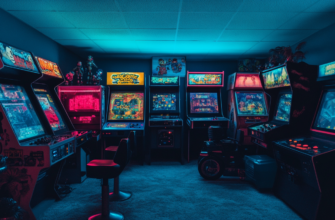- How playing video games can help improve your language learning
- Why video games are effective for language learning
- Step-by-step guide to learning a language with video games
- Step 1: Choose games with rich language options
- Step 2: Adjust your language settings
- Step 3: Learn in context
- Step 4: Use a translation tool or dictionary when stuck
- Step 5: Join gaming communities in your target language
- Practical tips for getting the most out of gaming as a language learning tool
- Combine gaming with other language learning methods
- Play games with strong narrative focus
- Gradually increase difficulty
- Make it fun
- Conclusion
How playing video games can help improve your language learning
Hey fellow gamers! Yeah, I’m talking to you—the one who’s been sneaking in some gaming sessions when you’re supposed to be “studying”! What if I told you that you could combine both? Yup, gaming can actually help you learn a new language. If you’re thinking, “There’s no way,” trust me, after you read this post, you’ll realize just how fun and effective it can be to learn a language through video games.
So, grab your controller (or keyboard and mouse), because we’re about to dive deep into how playing video games can become a true language-learning tool. I’m here to share what I’ve learned from my own gaming experience—stuff I wish I had known earlier. Ready? Let’s get into it!
Why video games are effective for language learning
We’ve all heard about apps and textbooks as traditional methods to learn new languages. But have you ever thought about the combination of interactive play and language immersion that video games offer? Here are a few reasons why games are actually a great way to learn a language.
- Immersion: Many modern games—especially MMORPGs or open-world RPGs—come with rich dialogue, missions, and lore, often in multiple languages.
- Contextual Learning: Since you’re interacting with the world of the game, it’s easier to understand the meaning of words within the game’s context.
- Repetition Without Boredom: Games can be highly repetitive, but let’s be real: grinding for that loot is way more appealing than looking at a grammar flashcard for the 10th time!
- Motivation to Understand: Think about it: If reading or understanding dialogue impacts your ability to progress, suddenly being able to read that quest description in Spanish makes it _fun_.
Step-by-step guide to learning a language with video games
Okay, so how do we actually use video games to improve our language skills? Let me break it down step by step:
Step 1: Choose games with rich language options
Not all games are created equal when it comes to language learning. You’ll want to pick games that offer lots of dialogue, text, and interaction. Think RPGs, MMORPGs, and narrative-driven games where you interact with the world around you. Games like The Witcher 3, The Elder Scrolls V: Skyrim, or Assassin’s Creed offer various language options and have deep lore and dialogue to help you immerse yourself.
Look for titles that have voice acting and subtitles in the language you’re learning. Most AAA games nowadays will give you the option to change language settings easily.
Step 2: Adjust your language settings
This one is a bit obvious, but you need to change your game’s language setting to the language you’re learning! Most major titles will allow you to change both the in-game dialogue and subtitle languages—choose both if possible! You can go with full voice overs in your target language or just enable subtitles at first if it’s too overwhelming.
Start with menus and tutorials in the new language if you’re a beginner. If you’re more advanced, throw yourself into full immersion and switch both audio and subs right away.
Step 3: Learn in context
When you see words or phrases you don’t understand, don’t sweat it. Understand that learning is a process. Games tend to throw words at you repeatedly (in dialogues, item descriptions, objectives, etc.). This is word association in real time, and it’s as close to natural immersion as it gets without living in a foreign country.
For example, let’s say you’re playing Witcher 3 in French. Geralt says “Il est temps d’aller” (It’s time to go). The first time, you might look it up. But after hearing it in multiple conversations, eventually, you’ll just know based on context. The idea is to pick up patterns naturally, the same way you learned your native language as a kid.
Step 4: Use a translation tool or dictionary when stuck
Nobody expects you to understand every word, especially when starting out. When you come across something you don’t know, take a moment to pause the game and use a translation tool or online dictionary. Have Google Translate or a handy app open on your second monitor or phone for quick look-ups.
Make sure to jot down any recurring words or phrases that seem important. Even if you don’t want to interrupt the flow of the game every time, do a quick review after you’ve paused or saved your game.
Step 5: Join gaming communities in your target language
Gaming is inherently social, especially with online multiplayer games. Joining a community of players who speak the language you’re learning is a fun and useful way to practice.
- Use in-game chats in your target language. MMORPGs like World of Warcraft or Final Fantasy XIV have global servers with chat functions that allow you to talk to people from across the world.
- Use voice communication with your teammates or guild in games like League of Legends or Overwatch. While it might be intimidating at first, you’ll improve your speaking and listening skills quickly!
- Search for Discord communities or forums where people discuss gaming in your target language. Joining these helps you practice not only writing but also understanding informal speech or gaming slang.
Practical tips for getting the most out of gaming as a language learning tool
Now that you have the basics down, let me give you a few pro tips to supercharge your language-learning experience while gaming.
Combine gaming with other language learning methods
While games are great for context and immersion, they may not give you the full range of grammar or syntax you need. Pair gaming with apps like Duolingo or Anki to fill in gaps related to structured grammar and vocabulary learning.
If you’re serious about advancing quickly, create a daily routine where you spend around 30 minutes with a dedicated language-learning app and follow it up with a gaming session to reinforce what you’ve learned. You’ll notice huge improvements!
Play games with strong narrative focus
Language learning thrives in story-rich environments. Games with complex narratives and deep character development will force you to pay attention to what’s being said.
Games like Firewatch (walking simulator with intense dialogue) or The Last of Us Part II (with emotionally rich conversations) are ideal for practicing conversational speech. These games require you to follow the story intently to know what to do next, making it a great opportunity to absorb the language effortlessly.
Gradually increase difficulty
The first day of learning a language in a game might feel like a lot, but stick with it! You can always jump back into your native language if you’re too overwhelmed at first. The key is to build up your language skills in a gradual and stress-free way. Start off with menus or subtitles, and as you get more comfortable, move to full dialogue immersion.
Make it fun
This is still gaming after all. The second you feel like it’s “too much like studying,” take a break. Learning languages through games is all about making the process enjoyable. Remember: Consistency beats intensity. Don’t feel guilty if you’re not picking up words right away. Just keep playing, and before long, you’ll notice you’re recognizing whole phrases without breaking a sweat.
Conclusion
There you have it—a comprehensive guide on how video games can actually help you learn a new language. Gaming is already immersive, engaging, and often time-consuming, so why not use that time to pick up a new skill? With the right games, communities, and a little discipline, learning can be super fun.
Now, I challenge you: Next time you boot up your favorite game, switch it into your target language and see how much you can pick up. Sure, it’ll feel weird at first, but trust me, you’ll thank me later when you’re farming XP and snagging vocabulary points at the same time.
Which game are you going to switch to a new language first? Let me know in the comments below, and good luck on your language-learning journey, gamer style!

















